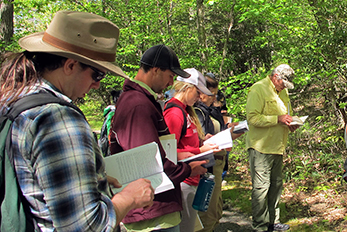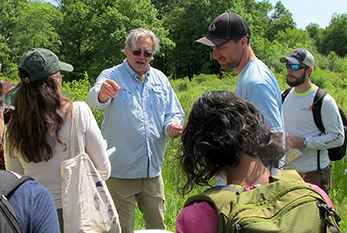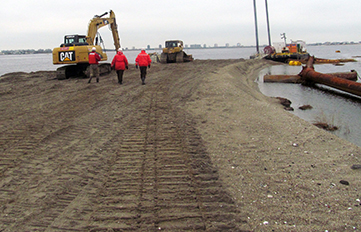Main Content
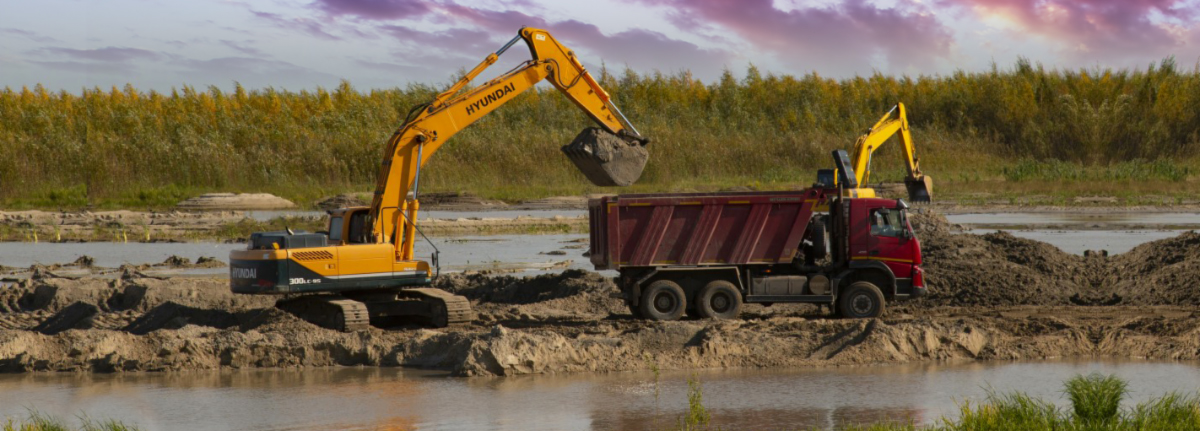
Jump to: Register | Course Details | Overview | Instructor | Reviews | CE Credits | Policies | Contact Us | Related Courses | Join Email List
Register Now
Pay with Credit Card:
Pay with Check, PO, or Money Order:
Course Details
Course Name: Wetland Construction: Principles, Planning, and Design
Course Code: EH0604WA26
Date: August 21, 22, 25, and 26, 2025 (4 day course)
Time: 9:00 am – 3:30 pm EDT (Log in at 8:45 am EDT)
Location: Online
Format: Live, instructor-led
Registration Fee: $1,150 per person
Early Bird Discount Fee: $1,050 per person (expires August 7, 2025)
Registration closes: August 14, 2025 (You may register after this date but we can’t guarantee the course textbook will be delivered to you in time if you do.)
Paying with a check, money order, or purchase order?
Payments should be made out to: Rutgers, The State University of New Jersey
Checks and money orders should be mailed to: Office of Continuing Professional Education, Attn: Registration Dept., 102 Ryders Ln, New Brunswick, NJ 08901-8519
Purchase Orders can be mailed to the address above or electronically sent to registration@njaes.rutgers.edu.
Course Overview
As state and federal wetland mitigation standards evolve away from an acre-for-acre approach to a focus on replacing wetland functions, your understanding of the wetland’s “wet part” has never been more critical.
This online class serves as an introduction to the fundamentals of functional design and provides the means to rapidly assess the distribution of hydrology on your site and create usable hydrographs for presentation of your wetland design.
Building on the student’s understanding of wetland functions, this course will also guide you through the many factors required to plan and design a functional wetland. Through online lessons, you will learn “real world” applications with an emphasis on two key components that drive success: DDT (depth, duration, and timing) of site hydrology and the landscape position.
Featured Topics
- Hydrogeomorphology: The importance of landscape position and where water is coming from
- Water Budget Calculation: Water inputs/outputs and TR-55 runoff curves
- The Thornthwaite Method: One method for calculating evapotranspiration
- Estimating Stream Flow and Producing Basic Hydrographs: Create usable hydrographs for presentation of your wetland design
Learn How to Develop a Successful Wetland Construction Plan
The course concentrates on the five basic steps in the process of developing a successful wetland construction plan.
1. Planning Your Project
Before developing a wetland construction plan, you must understand the purpose of the wetland and the ultimate goals of the project. Your overall wetland plan must account for location, size, physiognomy, basic hydrologic regime, and current/future land use. The proposed primary function(s) must be specific, measurable, and achievable. The wetland is built by constructing structural elements that support the primary function(s).
2. Selecting Your Construction Model
You must select appropriate models for construction. The hydrogeomorphic model analyzes suitable water supply and landscape position, while the wetland construction model covers basic methods of wetland construction suited to the nature of the water supply.
3. Preparing Your Water Budget and Hydrograph
Water inputs and outputs must be used to prepare water budgets and hydrographs. Successful hydrograph preparation is reliant on data collection and interpretation. Using the results of the modeling facilitates the preparation of the hydrograph.
4. Determining Proper Vegetation
Vegetation adaptation, selection, and planting are keys to any successful wetland construction plan. You must verify the adaptive modes of plants suitable for your hydrologic regime, and accurately match these plants with your project. You must locate plants which represent native species assemblages and select proper planting methods.
5. Manipulating Soil
Sub-grade soil percolation must be suitable for the hydrogeomorphic model you develop. Substrate soils must prove suitable to support selected vegetation selections both in texture and nutrient composition.
Learner Objectives
At the conclusion of the course, students will be able to display their proficiency in planning and designing a functional wetland, using the components of successful applications demonstrated during class presentations.
Why Take Our Wetland Construction Design Course?
This class will introduce you to the fundamentals of functional design and provide you with the means to rapidly assess the distribution of hydrology on your site and create usable hydrographs for presentation of your wetland design.
Rutgers instructors pioneered this functional hydrologic approach to wetland construction and have been teaching it since 1988. We are still one of only two schools in the nation that teach this approach.
Who Should Attend?
This class is intended for individuals seeking to learn how to develop successful wetland construction plans, as well as any environmental professional in the process of obtaining wetland permits. Past participants have included:
- Architects
- Biologists
- Computer Assisted Design (CAD) Professionals
- Design / Civil Engineers
- Ecologists
- Environmental Consultants
- Field Biologists
- Landscape Designers
- Project Managers
- Wetland Scientists
 Required Textbook
Required Textbook
A bound-copy of the required course text, Wetland Mitigation: Planning Hydrology, Vegetation and Soils for Constructed Wetlands by Gary J. Pierce, is included in your registration fee.
Do you work on wetland construction projects or want to learn more about this topic? Check out these two articles, which contain helpful tips and information to help make your next project a success.
Meet Your Instructor
Roy Messaros, Ph.D, PE, PWS, CFM

Roy Messaros is a Senior Research Project Manager working in the Rutgers Cooperative Extension Water Resources Program. He has a doctorate in Civil/Coastal Engineering from Stevens Institute of Technology and an M.A. and B.S. in Biological Sciences from William Paterson University.
Dr. Messaros’ professional experience and expertise includes hydraulic and hydrologic modeling, design, and construction for flood risk management, FEMA inundation mapping and certification, coastal storm surge protection, and wetland restoration/mitigation projects. Beneficial reuse of dredge material for tidal marsh restoration efforts has also been part of his wetland restoration experience.
He holds a Professional Engineering (PE) license in New Jersey. Messaros has 20 years of experience and a great passion for water resources, hydrology, and hydraulic analysis, wetlands for water quality improvement, limnology, and all things relating to ecosystem resilience and coastal engineering. His unique background and expertise across a variety of disciplines and services, both in engineering and science, allows him to bring a truly comprehensive approach to the Water Resources Program.
Messaros has extensive teaching experience serving as an adjunct professor at New York University Tandon School of Engineering and Stevens Institute of Technology, instructing both undergraduate and graduate level courses. He is particularly skilled at conveying complex ideas and concepts related to hydrology, watershed modeling, watershed resources engineering, and wetland design. His applied experience at the USACE and teaching provides a useful combination of knowledge of complex, technical concepts and the ability to share it with others through guidance and mentorship.
Student Reviews
“The level of detail was great. The instructor provided adequate background information and took the time to answer questions even though there was a ton of information to cover. The hydrograph models and case studies were the backbone of this course which are extremely useful for the construction of wetlands.”
– Past Participant
“I found getting experience with hydrographs and learning how to calculate water budgets (previously thought to me as being akin to reading tea leaves) was easily the most useful aspect of this program. I feel like someone has handed me a shiny new hammer, when previously I was trying to install nails with my palm.”
– Past Participant
“Mal is a great instructor with a limitless amount of knowledge and experience. I will be recommending this course to my colleagues.”
– Past Participant
Continuing Education Credits
The Wetland Construction: Principles, Planning, and Design course is approved for 2.4 Rutgers CEUs (24 contact hours), as well as the following credits from professional organizations.
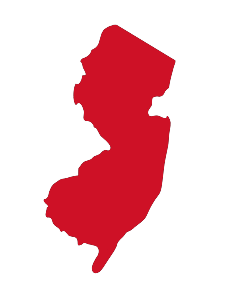 New Jersey
New Jersey
NJ Certified Public Works Managers (CPWM): 15 Technical, 3 Management, 3 Government Contact Hours
NJ Drinking Water and Wastewater Operators: 22.5 TCHs (Approval #01-091901-30)
NJ Health Officers and Registered Environmental Health Specialists (HO/REHS): Rutgers University, NJAES, Office of Continuing Professional Education has been approved by the New Jersey Department of Health as a provider of NJ Public Health Continuing Education Contact Hours (CEs). Participants who complete this education program will be awarded 20 NJ Public Health Continuing Education Contact Hours (CEs).
NJ Professional Engineers: 18 Continuing Professional Competency (CPC) credits
 New York
New York
NY Landscape Architects: 17.75 hr CL; 3.5 hr EA
NY Professional Engineers/Land Surveyors: 22 PDHs
 National
National
Society for Ecological Restoration (SER) Certified Ecological Restoration Practitioner (CERP) Program: 10 CECs
Society of Wetland Scientists Professional Certification Program (SWSPCP): 0.8 equivalent semester hours
Course Requirements and Policies
 Technology Requirements
Technology Requirements
This online class will be delivered via Canvas and Zoom.
After you register, you will receive an email from “Rutgers University Canvas” prompting you to click a link to finish setting up your Canvas account. If you do not see this message in your inbox, please check your junk/spam folder.
Registrants will receive more information as we move close to the course date and on February 4, an email with a link to access the course in Canvas will be sent along with instructions on how to proceed with the class and assignments.
Equipment you will need to access this training:
- Laptop or desktop computer is required for this class.
- Speakers and microphone are not necessary as a call-in option is available.
 Email Requirement
Email Requirement
A unique email address is required for each registrant to register and access our courses.
- If this is your first time registering with us, please provide your own unique email address when registering; do not provide an email address that you share with co-workers.
- If you have previously taken classes with us and have used an email address that you share with your co-workers or supervisor, your account must be updated with a unique email address. To do this, please send an email to us at registration@njaes.rutgers.edu stating that your email address needs to be changed and include:
- Your full name
- The shared email address that needs to be changed
- Your unique email address
- A phone number where you can be reached if we have any questions
 Photo ID Requirement
Photo ID Requirement
Each registrant will be asked provide a photo of him/herself holding their government-issued photo ID. This is required by credit boards so that you may receive credits for participating in this online course.
- You will receive a reminder email prior to the start of the class with further instructions. Wait to receive these instructions before you attempt to upload your ID.
- The photo must be clear enough that we can read your name and verify that the person pictured on the ID is in fact the person holding it.
- After an OCPE staff member reviews the picture and verifies your identity, you will have access to participate in the course when it begins.
 Cancellations and Substitutions
Cancellations and Substitutions
A $100 cancellation fee applies for this course. Substitutions are permitted. View our cancellation policy.
Program Questions? We’re Here to Help!
If you have any questions about Wetland Construction: Principles, Planning, and Design, please don’t hesitate to reach out to us.
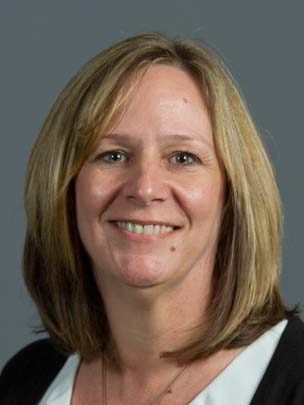
Program Coordinator: Suzanne Hills
848-932-7234
suzanne.hills@rutgers.edu

Administrative Assistant: Amy Smith
848-932-7764
amy.smith70@rutgers.edu
For registration assistance, please contact our Registration Department at 848-932-9271, option 2 or email registration@njaes.rutgers.edu.
